Exceeding your expectations, aluminium windows are a popular choice for many homeowners. One of the key factors that you need to consider is their suitability for your specific climate zone. In this informative blog post, we will explore the pros and cons of aluminium windows in different climate zones, helping you make an informed decision for your home. From the durable nature of aluminium to the potential challenges in extreme climate conditions, we’ll cover it all.
Key Takeaways:
- Aluminium windows are suitable for all climate zones: Due to their durability and resistance to corrosion, aluminium windows are suitable for various climate zones, including coastal areas, hot and humid regions, and cold weather conditions.
- Proper insulation is crucial: While aluminium windows can perform well in different climate zones, it is important to ensure proper insulation to maximise energy efficiency and thermal performance, especially in extreme weather conditions.
- Consider additional factors: When choosing aluminium windows for different climate zones, other factors to consider include glass type, glazing, and window design to meet specific performance requirements for insulation, solar heat gain, and air leakage.

Aluminium Windows in Different Climates
When considering the suitability of aluminium windows for your home, it’s essential to take into account the climate in which you live. Different climates can present unique challenges for window materials, and it’s crucial to understand how aluminium windows perform in various conditions.
Performance in Cold Climates
If you live in a cold climate, you may be concerned about the potential for aluminium windows to allow heat to escape from your home. However, aluminium windows can be an excellent choice for cold climates, as they are incredibly durable and resistant to harsh weather conditions. With the right thermal break technology and proper insulation, aluminium windows can provide excellent thermal performance, keeping your home warm and reducing your energy costs.
Suitability for Hot and Humid Regions
In hot and humid regions, the concern may be more focused on the potential for aluminium windows to trap heat and allow condensation to form. However, with the right glass coatings and insulation, aluminium windows can be an effective choice for these climates. They are resistant to corrosion from moisture, making them a durable option for homes in hot and humid areas. Additionally, their strength and stability make them a reliable choice to withstand the demands of these climates.
Advantages of Aluminium Windows
When considering the suitability of aluminium windows for your home, it’s important to take into account the numerous advantages they offer. Aluminium windows are not only aesthetically pleasing, but they also provide a range of benefits that make them an attractive option for homeowners in all climate zones. Let’s explore some of the key advantages of aluminium windows.
Durability and Maintenance
One of the standout features of aluminium windows is their durability. Unlike other materials, aluminium is resistant to corrosion, which makes it particularly well-suited for coastal areas where the air is laden with salt. This resistance to corrosion ensures that your windows will maintain their structural integrity and appearance over time, reducing the need for frequent maintenance and repairs. Additionally, aluminium windows are easy to clean and require minimal upkeep, giving you peace of mind and saving you time and effort in maintaining your home’s windows.
Energy Efficiency and Insulation
When it comes to energy efficiency, aluminium windows are a top choice. Their inherent strength allows for a narrower frame design, which means more glass and less frame, maximising the natural light entering your home. The use of thermal break technology in modern aluminium windows also provides excellent insulation, reducing heat transfer and enhancing the overall energy efficiency of your home. This not only helps to keep your home comfortable year-round but also lowers your energy consumption, resulting in potential cost savings on your energy bills.
Potential Limitations of Aluminium Windows
When considering aluminium windows for your home, it is important to be aware of potential limitations that may impact their suitability for certain climate zones. While aluminium windows offer various benefits, there are particular factors that you should take into account to ensure they are the right choice for your specific needs.
Thermal Conductivity Considerations
One potential limitation of aluminium windows is their thermal conductivity. Aluminium is a highly conductive material, which means that it can transfer heat and cold more easily than other window materials. In colder climates, this can result in increased heat loss and reduced energy efficiency, potentially leading to higher heating costs. To mitigate this, it is crucial to select aluminium windows with thermal breaks or consider alternative window materials that offer better insulation properties. You can learn more about choosing the most suitable aluminium windows according to your climate here.
Addressing Misconceptions
There are often misconceptions about the suitability of aluminium windows for various climate zones. One common misconception is that aluminium windows are not suitable for hot climates due to their conductivity and potential for heat gain. However, advancements in window technology have allowed for the development of aluminium windows with superior thermal performance, making them suitable for a wide range of climates. By choosing high-quality aluminium windows with the right specifications, you can enjoy the benefits of durability and modern design without compromising on energy efficiency, regardless of the climate in which you live.
Making the Right Choice
When choosing windows for your home, it’s important to consider the specific climate zone you live in. Different materials and window types perform differently in hot, cold, and mixed climates. If you live in a hot climate, you may want to consider the Best Windows for Hot Climates to help you make the best decision for your location.
Assessing Local Climate Needs
Before making a decision, you should assess the climate needs in your local area. Consider the temperature range, humidity levels, and exposure to extreme weather conditions. For hot climates, you’ll want windows that offer high thermal performance, UV protection, and resistance to warping or discolouration due to sun exposure.
Comparing Aluminium with Other Materials
When it comes to choosing windows for hot climates, it’s important to compare different materials to see which one suits your needs best. Here’s a breakdown of aluminium and other materials:
| Factors | Aluminium |
| Thermal Performance | Aluminium windows offer excellent thermal performance, keeping your home cool in hot climates. |
| UV Protection | They provide good UV protection, preventing furniture and flooring from fading due to sun exposure. |
| Resistance to Warping | Aluminium windows are highly resistant to warping or discolouration caused by heat and sunlight. |
| Energy Efficiency | They are energy-efficient, helping to reduce your cooling costs in hot climates. |
Conclusion
Hence, it is clear that aluminium windows are suitable for all climate zones. With their durability, resistance to corrosion, and ability to withstand extreme temperatures, aluminium windows are a practical choice for any climate. Whether you live in a hot, humid environment or a cold, frosty one, aluminium windows can provide the strength and insulation you need to maintain a comfortable and energy-efficient home. Consider investing in aluminium windows for your property to ensure long-lasting, weather-resistant performance throughout the year.
FAQ
Q: Are aluminium windows suitable for all climate zones?
A: Yes, aluminium windows are suitable for all climate zones. Their durability and resistance to weather and temperature changes make them a great choice for any climate.
Q: How do aluminium windows perform in humid climates?
A: Aluminium windows perform exceptionally well in humid climates. They are resistant to moisture and will not rot, warp, or swell, making them ideal for high humidity areas.
Q: Are aluminium windows suitable for cold climates?
A: Yes, aluminium windows are suitable for cold climates. They provide excellent insulation and can help to keep heat inside, making them a great choice for colder regions.
Q: Do aluminium windows perform well in hot climates?
A: Aluminium windows excel in hot climates due to their ability to resist heat and UV rays. They will not fade, crack, or warp in high temperatures, making them a reliable choice for hot regions.
Q: Can aluminium windows withstand strong winds and storms?
A: Yes, aluminium windows are extremely durable and can withstand strong winds and storms. Their strength and rigidity make them a secure option for areas prone to severe weather conditions.
Q: Do aluminium windows require special maintenance in specific climate zones?
A: Aluminium windows require minimal maintenance in any climate zone. Regular cleaning and lubrication of moving parts are all that is necessary to keep them in top condition, regardless of the climate.
Q: Are there any climate zones where aluminium windows are not suitable?
A: Aluminium windows are suitable for virtually all climate zones. Their versatility and resilience make them a practical choice for a wide range of environmental conditions.






